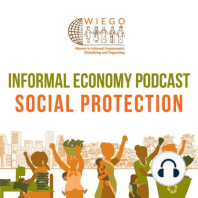25 min listen

#15 Lessons From Government Responses to Protect Informal Workers
#15 Lessons From Government Responses to Protect Informal Workers
ratings:
Length:
32 minutes
Released:
Jun 1, 2020
Format:
Podcast episode
Description
And in this episode, we bring you the third and last part of the especial mini-series on social protection for informal workers in the context of the Covid-19 global pandemic. We will look more closely on how governments around the world are responding to the global crisis in order to address to the urgent social protection needs of vulnerable people, in particular, informal workers.
To help us understand the main challenges and concrete issues policy makers are facing as the first government responses are being implemented, we invited Valentina Barca.
Valentina is an independent consultant, and she is a specialist in social protection delivery systems. She is part of a multi-disciplinary research team, called SPACE, that is working to provide policy analysis to the responses on social protection during this global pandemic, in order to support countries to think about how to better address to the current crisis. Valentina analyses issues related to the targeting of informal workers, patterns in government responses, implementation problems that emerge; why some countries are responding quicker and more effectively than others, and which are the challenges and lessons to reach informal workers, that we can take from the policies that are being implemented.
*Our theme music is Focus from AA Aalto (Creative Commons)
REFERENCES
WIEGO response tracking https://www.wiego.org/government-responses-covid-19-crisis
Rapid Assessment
World Bank Tracking: Global social protection Covid-response paper https://www.ugogentilini.net/?p=920
OECD Blog: The COVID-19 crisis: income support to informal workers is necessary and possible, by Laura Alfers https://oecd-development-matters.org/2020/04/22/the-covid-19-crisis-income-support-to-informal-workers-is-necessary-and-possible/
OECD Policy Responses to Coronavirus www.oecd.org/coronavirus/policy-responses/supporting-livelihoods-during-the-covid-19-crisis-closing-the-gaps-in-safety-nets-17cbb92d/
To help us understand the main challenges and concrete issues policy makers are facing as the first government responses are being implemented, we invited Valentina Barca.
Valentina is an independent consultant, and she is a specialist in social protection delivery systems. She is part of a multi-disciplinary research team, called SPACE, that is working to provide policy analysis to the responses on social protection during this global pandemic, in order to support countries to think about how to better address to the current crisis. Valentina analyses issues related to the targeting of informal workers, patterns in government responses, implementation problems that emerge; why some countries are responding quicker and more effectively than others, and which are the challenges and lessons to reach informal workers, that we can take from the policies that are being implemented.
*Our theme music is Focus from AA Aalto (Creative Commons)
REFERENCES
WIEGO response tracking https://www.wiego.org/government-responses-covid-19-crisis
Rapid Assessment
World Bank Tracking: Global social protection Covid-response paper https://www.ugogentilini.net/?p=920
OECD Blog: The COVID-19 crisis: income support to informal workers is necessary and possible, by Laura Alfers https://oecd-development-matters.org/2020/04/22/the-covid-19-crisis-income-support-to-informal-workers-is-necessary-and-possible/
OECD Policy Responses to Coronavirus www.oecd.org/coronavirus/policy-responses/supporting-livelihoods-during-the-covid-19-crisis-closing-the-gaps-in-safety-nets-17cbb92d/
Released:
Jun 1, 2020
Format:
Podcast episode
Titles in the series (44)
#03b Saúde e Segurança no Trabalho e Catadores (in Portuguese): Em abril é comemorado o Dia Mundial Da Saúde e o … by Informal Economy Podcast: Social Protection